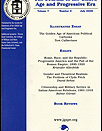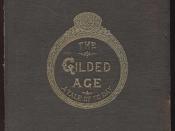The politics of the Gilded Age failed to deal with the critical social and economical issues of the times. It was the era filled with forgotten presidents and politicians who ignored the problems erupting in the cites. Monopolies ruled over all the aspects of life, and the greedy men who ruled these monopolies caused poverty throughout the nation. The ideas of limited government caused the political parties to not take a stand on important issues. The "wonderful" Gilded Age in fact was not a pretty sight.
The Gilded Age was a time of inventions and reform, resulting in large numbers of immigrants and huge cities filled with skyscrapers. Men such as Thomas Edison, inventor of the light bulb, and Alexander Graham Bell, inventor of the telephone, gave the nation a modern taste. Whereas people before the Civil War had to use candles and fires for light and write letters that had to be carried on horseback, people during the Gilded Age could have light with the flip of a switch and could communicate to others in seconds.
With this wave of inventions came a wave of immigrants. These "new" immigrants came from southern and eastern Europe and were mainly Italians, Greeks, and Russians (Newman and Schmalbach 359). Soon efforts to restrict immigration arose. Groups and organizations such as labor unions, which feared that employers would use immigrants to depress wages and break strikes, and the Social Darwinists, who viewed the immigrants as inferior beings, sought to help in the struggle against immigrants Newman and Schmalbach 361). Immigrants moved to the cities where jobs were available and where luxuries such as running water, electricity, and cars were available at low costs. New reforms came about such as the Social and Reform Darwinists. The Social Darwinists believed in the survival of...


